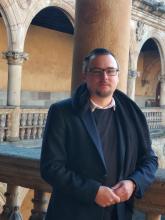Peno, Michal

Speaking generally, my research in the IISL was about the problem of crime as an evil experienced by a specific political community. This community defines this evil not only by means of regulations set up by the state agencies, but also, to the same extent, by means of norms and directives that make up the collective beliefs of its participants (also referred to as spontaneous order). This prompts us to choose a research perspective that goes beyond the dogmatically understood theory of law. These problems are complemented with considerations in social philosophy, sociology, and history. The key to the work is to determine the use of the term “crime” in imprecise natural language. Of course, the language of legal doctrines (legal science) and legal texts play a special role in this case. Crime is not a juridical fiction, and the sense of criminal responsibility gives the axiological element, which the legislator should (must) take into account when creating law and practicing good (decent) criminal law policy. Whether the legislator creates crimes or recognizes certain acts that are already crimes depends on how—with the help of nonlegal reasons—the scope of freedom of the legislator in shaping the criminal policy will be determined.



